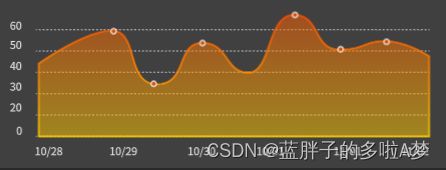Vue echarts 折线图 背景颜色渐变 (两种实现方式)
需求
实现方式
两种方法
方法一:color: new echarts.graphic.LinearGradient(0, 0, 0, 1, [{},{},{}])
方法二:避开new echarts,color: {x: 0, y: 0, x2: 0, y2: 1,colorStops: [{},{},{}]}
option = {
xAxis: {
type: 'time',
data: ['10/28', '10/29', '10/30', '10/31', '11/01', '11/02']
},
yAxis: {
type: 'value'
},
series: [
{
data: [120, 200, 150, 80, 70, 110, 130],
type: 'line',
areaStyle: { // 使用方法二的写法
color: {
type: 'linear',
x: 0, //右
y: 0, //下
x2: 0, //左
y2: 1, //上
colorStops: [
{
offset: 0,
color: '#A05920' // 0% 处的颜色
},
{
offset: 1,
color: '#C7982A' // 100% 处的颜色
}
]
}
},
emphasis: { // 选中时的颜色
itemStyle: { // 使用方法一的写法
color: new echarts.graphic.LinearGradient(0, 0, 0, 1, [
{ offset: 0, color: '#A05920' },
{ offset: 1, color: '#C7982A' }
])
}
}
}
]
};
tips:
如果new echarts.graphic.LinearGradient报错,不能正常显示
可使用:new this.$echarts.graphic
color: [
new this.$echarts.graphic.LinearGradient(0, 0, 0, 1, [
{ offset: 0, color: '#A05920' },
{ offset: 1, color: '#C7982A' }
]),
new this.$echarts.graphic.LinearGradient(0, 0, 0, 1, [
{ offset: 1, color: "#08DDF280" },
{ offset: 0, color: "#3D9CF580" },
]),
], //自定义颜色
